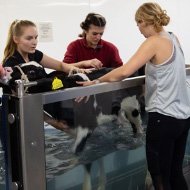
The calf had an abnormal gait owing to a spinal issue.
Veterinary physiotherapists at Harper Adams University have developed a novel way to help rehabilitate dairy calves with mobility problems.
The venture arose after a calf born into the University's dairy herd couldn't walk in the usual way owing to an abnormal gait. A spinal issue meant that, rather than taking individual steps with her hind legs, the calf could only jump with them both together, similar to how a rabbit would hop.
Vets found that as well as being a tiring way of moving, the calf wasn't developing the correct muscles for movement or balance, and therefore leaving her unable to walk would have been life-limiting.
Following a number of traditional treatment approaches, the team from Horizon Dairy Vets, who treat the Harper Adams Herd, referred the calf to the Vet Rehab centre run by the University’s veterinary physiotherapy team.
The physiotherapists, who affectionately named the calf 'Bunny', began developing a unique water-based programme of rehabilitation led by a group of final year BSc (Hons) Veterinary Physiotherapy students.
The hydrotherapy suite at the campus, which includes an underwater treadmill, is most commonly used with dogs, but because of Bunny's small size, it was also able to accommodate her.
Veterinary physiotherapy programme manager at Harper Adams, Helen Morrell, explained: “The water works in two ways, it slows her movement down and prevents her from being able to hop, and she also has to pull her legs through against the resistance the water provides which strengthens her muscles.
“In the water treadmill the easiest way to move is one leg at a time, which is the way we want Bunny to learn to use her legs. With repeated short bursts of walking underwater on the moving belt we have been able to get her using each hind leg individually.”
Despite having treated many kinds of animals at the centre before, Bunny's unique case did present the team with some challenges. Unable to find a similar procedure that had been used on cattle, it meant they needed to develop processes for Bunny that were specifically tailored for her care - even training her to walk on a halter and rope before anything else.
Helen added: “This is the first calf case I’ve seen referred for physiotherapy because of a neurological issue affecting gait in this way.
“We have treated adult cows before for various musculoskeletal conditions, but not for anything involving their nervous systems dysfunctioning to the extent that they cannot properly walk.
“There are no case studies to follow in textbooks, or in scientific journals, so we’ve had to work from first principles and a knowledge of what works in other species, such as horses and dogs, to clinically reason our treatment approach.”
The students and Vet Physio Team worked throughout the winter to rehabilitate Bunny and helped to make her treatment a success.
Student Eliza Westbrook, who kept Bunny focussed throughout her hydrotherapy sessions with a bottle of electrolyte, said: “For me, the most challenging aspect was that I don’t have much experience with cows – I kept thinking of her as a horse or a dog at first, but she is a cow, and she thinks like a cow!
“It was challenging to adapt your previous knowledge to the case, but it has been fascinating.”
Image (C) Harper Adams University.



 The veterinary mental health charity Vetlife is inviting the veterinary community to join it for a sponsored cold-water dip.
The veterinary mental health charity Vetlife is inviting the veterinary community to join it for a sponsored cold-water dip.